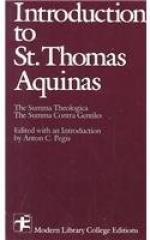
|
| Name: _________________________ | Period: ___________________ |
This test consists of 15 multiple choice questions and 5 short answer questions.
Multiple Choice Questions
1. The divine essence is exposed through what?
(a) A subtle vision of God.
(b) The works of others.
(c) An image of God.
(d) An immediate vision of God.
2. When is man's ultimate happiness, according to Aquinas?
(a) In childhood.
(b) In this life.
(c) In old age.
(d) Not in this life.
3. God cannot be the end of things as though He were something effected, but only as ______________.
(a) Something to be challenge.
(b) Something to be altered.
(c) Something already existing and to be acquired.
(d) Something to be created.
4. Appetites are ______.
(a) Immovable.
(b) Changing.
(c) Movable.
(d) Strong.
5. Aquinas sees individuating qualities as signs of _____________________ rather than as the type of separation associated with biological and social organizations.
(a) Fundamental togetherness.
(b) Unnatural separateness.
(c) Unnatural togetherness.
(d) Fundamental separateness.
6. How many articles are there for Question LXIV: On the Mean of Virtue?
(a) Four.
(b) Five.
(c) Seven.
(d) Six.
7. When there is an organizer or leader of a group, Aquinas explains that only the leader is considered to be what?
(a) The reactor.
(b) The reagent.
(c) The actor.
(d) The agent.
8. Aquinas also believes that humans do perceive the same principles when they use_______________ thought.
(a) Abstract and conceptual.
(b) Real and imagined.
(c) True and false.
(d) Abstract and concrete.
9. What do some think regarding whether one person can understand one and the same thing better than another can?
(a) No one can know more than another.
(b) Perfect understanding is not possible.
(c) Only perfect understanding or complete lack of understanding exists.
(d) No one has perfect understanding or a complete lack of understanding.
10. Aquinas goes back to pre-Socratic times and the observation that the system is rooted in motion, which ___________ certainty.
(a) Benefits.
(b) Supports.
(c) Is similar to.
(d) Undermines.
11. The Fourth Article is Whether We Can Understand Many Things at the Same Time. What does Aquinas say that the ability to distinguish two things involves?
(a) Having intellect.
(b) Having two different things.
(c) Having two things.
(d) Knowing their difference.
12. What is the Summa Theologica part of?
(a) The Bible.
(b) The Koran.
(c) A new tradition.
(d) A long tradition.
13. In Question XII: On Intention. Whether intention is an Act of the Intellect or of the Will, how many objections are made to the first article?
(a) Four.
(b) Three.
(c) Five.
(d) Two.
14. Choice is the theme, and what is 'choice' described as?
(a) The actions of man.
(b) A combination of thought and natural appetite or body.
(c) Thought.
(d) Natural appetite.
15. How many articles are there for Question XCIII: The Eternal Law?
(a) Six.
(b) Five.
(c) Four.
(d) Three.
Short Answer Questions
1. Due to the answer to number 139, Aquinas claims that happiness ______________.
2. The divine substance goes beyond the height of brilliance, and extends beyond what?
3. In The End of Man: The Summa Contra Gentiles: Third Book: Chapter I That Every Agent Acts For an End, what behavior does Aquinas refer to?
4. The desire for intellectual stimulation and a physical drive such as hunger represent ________________ these two types of appetites.
5. In Chapter XVII: That All Things are Directed to One End, Which is God, Aquinas teaches by what?
|
This section contains 530 words (approx. 2 pages at 300 words per page) |

|




